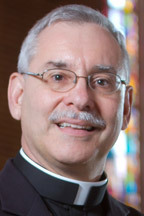
Bishop Anthony B. Taylor delivered this homily Oct. 16.
Jesus had a great deal of “ambiguity tolerance.” He was able to deal patiently with messy situations. We see it in his dealings with Zacchaeus, with the Samaritan Woman and the tax collector who went to the Temple to pray. Life is complicated and Jesus was less concerned about looking good in the eyes of others than he was engaging the world as it really is.
Soon we have our national elections, for which we will need a great deal of “ambiguity tolerance.” And yet as citizens, we are obligated to participate in this messy process — even if we don’t like any of the options.
And I’m not going to make it any easier for you: no party has our endorsement, not even the third parties that are out there. There is actually a party that does model itself on Catholic teaching, the American Solidarity Party. You might want to take a look at its platform for future reference, but they won’t be on the ballot in Arkansas this year.
But regarding the options that are available to us this year, all the parties take positions that are contrary to our faith, and in the case of some candidates, there are serious questions of character. For this reason, some people will vote for one party for president and the other for Congress in the hope that they will sort of keep each other in check. But gridlock is itself a big problem.
Regarding our options this year, I often hear people say, “Well, you just have to choose the lesser of two evils,” but that is a trap. We may never choose evil. We can, however, choose the candidate whom we think might do more good than the others, especially if we believe that we might be able to limit the harm we fear through our system of checks and balances. This requires a lot of ambiguity tolerance.
To help us sort out what to do, the bishops of the United States have issued a “Faithful Citizenship” document to help us make a prudential judgment regarding the difficult and confusing choices before us. The document can be downloaded from the website of the United States Conference of Catholic Bishops. There are seven key themes of Catholic social teaching which we must weigh seriously as we prepare to vote:
To this I would add a note about medical marijuana, about which people have reason to fear a slippery slope to the disaster of recreational marijuana. From a theological standpoint, the Church has no moral objection to the medical use of marijuana, just like any other drug when used for a genuine medical purpose. Even so, it will be very important — and difficult — to put safeguards in place sufficient to prevent it from falling into non-medical hands — especially the youth whose brains are still developing. Hence, the voters have a prudential decision to make.
You and I have a lot to pray for between now and election day: especially for a renewed politics that focuses on moral principles, the defense of life, the needs of the weak and the pursuit of the common good. And, of course, we must also consider each candidate’s integrity, philosophy and performance. We don’t just need “ambiguity tolerance” this election cycle; we need the wisdom of Solomon and the guidance of the Holy Spirit.
Please read our Comments Policy before posting.
Article comments powered by Disqus Don’t sign new abortion petition, Bishop Taylor asks
Don’t sign new abortion petition, Bishop Taylor asks
 Bishop says Hot Springs priest taking leave of absence
Bishop says Hot Springs priest taking leave of absence
 Fasting obligation lifted for those cleaning up after storm
Fasting obligation lifted for those cleaning up after storm
 Jesus loves bad people the same as good people
Jesus loves bad people the same as good people
 The mess and miracle of Santo Niño de Cebú
The mess and miracle of Santo Niño de Cebú
 St. Paul says: How does the Bible define love?
St. Paul says: How does the Bible define love?
 6 steps to getting married in Diocese of Little Rock
6 steps to getting married in Diocese of Little Rock
 Most frequently asked questions on Catholic marriage
Most frequently asked questions on Catholic marriage
 St. Timothy winner recommends adoration to other teens
St. Timothy winner recommends adoration to other teens
 St. Joseph a model of solidarity with immigrants
St. Joseph a model of solidarity with immigrants
 Two gifts after Jesus’ death: Virgin Mary and Eucharist
Two gifts after Jesus’ death: Virgin Mary and Eucharist
 Why we have an altar, and not just a communion table
Why we have an altar, and not just a communion table
 Pope: Wars should be resolved through nonviolence
Pope: Wars should be resolved through nonviolence
 Living relationship with Jesus Christ in the Eucharist
Living relationship with Jesus Christ in the Eucharist